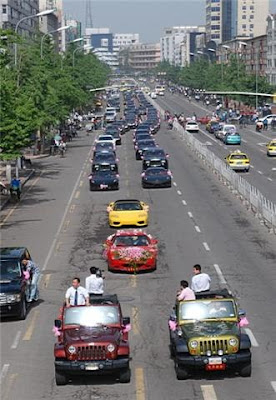
The first half of 2010 in China has been characterised by an eruption of strike activity by China’s workers (see previous post).
This points to the antagonistic nature of social contradictions in the supposedly socialist Chinese society.
Under capitalism, workers are exploited because a part of their working day consists of unpaid labour time during which they produce a surplus value in the form of additional commodities for sale. This unpaid labour time is hidden by the apparent payment of a full day’s wage by the capitalist. The capitalist realises this surplus value as a profit through sale of the commodity. The contradiction that is inherent to capitalism exists between the socialised process of production and the private appropriation of surplus value.
Surplus value continues to be created in socialist societies where commodity production and the law of value continue from capitalism. However, surplus value is transformed into a component of the total social product. It is appropriated as profit from the sale of commodities by the working class itself and returned to the state as the owner of the means of production. Through its party (Communist) and government, the working class decides on the appropriate social distribution of the social product. Exploitation is removed from the equation when the private appropriation of surplus value is undertaken by the social agency of the creators of the surplus value.
However, socialist societies can undergo regression. If a group forms within the party and government that seeks to use its decision-making power to divert surplus value for private purposes (expanding top level salaries, introducing bonuses and incentives that go to those at the top, transforming state-owned enterprises into joint ventures or forcing their private sale through bankruptcy provisions) then it is possible for a new bourgeois class to emerge. Once any part of the total social product is appropriated for the private benefit and enjoyment of a privileged elite, the socialist society is taken on the capitalist road and the social product is broken apart into its exploitative form, with surplus value taken from the working class for the parasitic consumption of the new elite.
This is sadly the state of affairs in China.
The reforms begun under Deng Xiaoping took China down this path. The question was never whether it mattered if it was a black cat or a white cat that caught the mice; the real question was for whom the mice were caught.
Deng’s reforms enabled the appropriation of surplus value by party and government upper echelon bureaucrats, by enterprise managerial staff, by owners of privatised industries and services, by foreign and domestic investors, by the receivers of corrupt payments for favours, by shareholders and market manipulators. These were the beneficiaries of the mouse-catching of Chinese economic activity in the post-Mao era.
Look at last year's case of Wen Qiang, former Director of the Chongqing Justice Department. He had managed to corruptly receive 20 million yuan which he had tried to conceal by wrapping the entire amount in waterproof oilskins and placing it at the bottom of a pool (see retrieved money on display below). Unfortunately, corruption on this scale is all too common in China. This is money created by the labours of the working class but diverted from them and hoarded away at a time when many of the Chinese people can no longer afford education or health care.
 Look at the extravagant and boastful weddings of the super rich of the new Chinese bourgeoisie. The fleet for the wedding of a coal bosses’ son on June 20, 2009 in Datong, a major city in Shanxi, included a camera team of 6 Jeeps, 4 Ferraris as lead vehicles, a main fleet of 4 Rolls Royces, and a retinue comprising 6 Mercedes, 6 Bentleys, 20 Audi A8s, a Hummer bringing up the rear, and Porsche Cayennes for "odd jobs” (below).
Look at the extravagant and boastful weddings of the super rich of the new Chinese bourgeoisie. The fleet for the wedding of a coal bosses’ son on June 20, 2009 in Datong, a major city in Shanxi, included a camera team of 6 Jeeps, 4 Ferraris as lead vehicles, a main fleet of 4 Rolls Royces, and a retinue comprising 6 Mercedes, 6 Bentleys, 20 Audi A8s, a Hummer bringing up the rear, and Porsche Cayennes for "odd jobs” (below). 
Despite press campaigns against ostentatious displays of wealth, lavish banquets are still thrown with enormous waste of food and ritual displays of status associated with the provision of rare and endangered species as food. Mo Yan, the novelist who provided us with Red Sorghum in 1987, satirised this culinary elitism in 1992 with The Republic of Wine, a story in which selected boy babies are fattened as “meat boys” and served as the highlight at banquets. It was an effective satire because it dealt with a real and growing abuse of position and power.
 A recent report on the East South West North blog refers to a copy of a restaurant bill posted on the Internet, according to which four customers ate: four servings of abalone with list price of 8,800 yuan each; four orders of braised truffles/shark fin soup with list price of 13,888 yuan each; four orders of South African bird's nest soup with wild honey at 9,860 each; 1980 vintage Lafitte red wine; 50-year-vintage Maotai; ... These items alone already amounted to more than 180,000 yuan. There were also some other miscellaneous items such as beef with
A recent report on the East South West North blog refers to a copy of a restaurant bill posted on the Internet, according to which four customers ate: four servings of abalone with list price of 8,800 yuan each; four orders of braised truffles/shark fin soup with list price of 13,888 yuan each; four orders of South African bird's nest soup with wild honey at 9,860 each; 1980 vintage Lafitte red wine; 50-year-vintage Maotai; ... These items alone already amounted to more than 180,000 yuan. There were also some other miscellaneous items such as beef with pepper, braised tofu, etc which were offered free of charge. The customer signed the bill for the round sum of 200,000 yuan.
pepper, braised tofu, etc which were offered free of charge. The customer signed the bill for the round sum of 200,000 yuan. The report continued:
 “Could this be real? Many netizens have their doubts, because they think that this is yet another promotional gimmick.
“Could this be real? Many netizens have their doubts, because they think that this is yet another promotional gimmick.“From the telephone number listed on the bill, our reporter contacted the restaurant and spoke to the manager named Yang.

“Manager Yang confirmed that this was true. He told the reporter what happened: ‘There were four customers who showed up for lunch. They ate so late that the restaurant workers had to work overtime. They drank a lot. For some reason, they got into an argument with the servers. The attitude of patrons is that if you don't think that we can afford it, we will deliberately make it hard on you. So this patron had two carloads of one yuan bills delivered to pay the bill. He wanted to cause us grief [by counting the money bills one at a time].’

“This restaurant specializes in serving bird's nest, abalone and shark fin, with an average expenditure of 1,500 to 2,000 yuan per capita. The patrons are mostly coal mine owners, company bosses, etc. Apart from the food and wine, the restaurant also imposes a 10% service charge. They provide side dishes and fruits for free.
“Is this a promotional gimmick by this restaurant? Our reporter tried hard but was unable to reach this "most awesome restaurant patron ever.”
Whether or not it was a promotional gimmick or a real display of ostentation and arrogance by coal mine owners and company bosses, the fact remains that such a restaurant exists to satisfy the parasitic consumption of an exploitative class in China whilst workers are reduced to fighting for shorter working hours and higher wages and are denied access to free medical and educational services.
The Gini Coefficient for China (an international measure of the disparity between a nation’s social poles of wealth and poverty) rose from 0.25 in 1983 (measured by Chen Jiandong and others in The Trend of Gini Coefficient in China http://www.bwpi.manchester.ac.uk/resources/Working-Papers/bwpi-wp-10910.pdf ) to 0.47 in 2008, according to Zhou Tianyong, senior economist of the Party School of the Central Committee of the Communist Party of China. The larger the coefficient the wider the social polarisation. Going beyond 0.5 is usually taken as an indicator the imminent social breakdown of the society concerned.

(Above: at the start of the world financial crisis laid off migrant workers in southern China rally under signs saying "I want to go home". Destitute and without means of transport despite long hours creating surplus value, profit, for bosses.)
China's transformation from a socialist society to a capitalist society will invariably see its emergence as an exporter of capital and a purveyor of neo-colonialism.
The Australian resource sector is in the forefront of this development.
Australian workers and Chinese workers have a shared interest in eliminating all forms of exploitation and greed. Their friendship and understanding will grow in struggle.

No comments:
Post a Comment